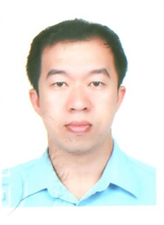Conjugated Molecule Design and Synthesis for Advanced Organic and Perovskite Photovoltaics
Abstract:
The rapid expansion of self-powered, integrated Internet of Things (IoT) devices has fueled interest in advanced photovoltaic technologies capable of efficiently harvesting energy. Among these, perovskite solar cells (PSCs) and organic photovoltaics (OPVs) have emerged as frontrunners due to their high power conversion efficiency and solution-based fabrication, making them ideal candidates for addressing IoT energy challenges. A critical factor in optimizing PSC and OPV performance lies in mitigating interfacial defects through engineered charge transport layers, including electron transport layers (ETLs), hole transport layers (HTLs), and interfacial layers (IFLs). In this keynote, I will present our recent advancements in the development of conjugated molecules for ETL, HTL and IFLs, enabling significant performance improvements.[1] Our strategies include the design of efficient electron-selective layers, perovskite bulk passivation techniques, and the implementation of bilayer HTL structures to enhance indoor PSC efficiency. Specifically, we demonstrate how organic semiconductors, sol-gel nickel oxide (NiOx), and self-assembled (SA) layers optimize energy alignment at interfaces, leading to enhanced carrier transport in PSCs. Under 3000K LED illumination at 1000 lux, our optimized Cs₀.₁₈FA₀.₈₂Pb(I₀.₈Br₀.₂)₃ devices achieved an impressive indoor power conversion efficiency exceeding 42%.[2] Furthermore, we optimized bulk heterojunction (BHJ) blend layers—such as PM6:PY-IT, and PM6:Y6 and its derivatives—and their ternary counterparts to realize high-performance OPVs.[3] Our studies demonstrate that optimized ternary blend morphologies enhance exciton dissociation, carrier transport, and overall power conversion efficiency. Additionally, we highlight improvements in OPV thermal and ambient stability, paving the way for more robust and reliable organic photovoltaic technologies. These advancements underscore the critical role of molecular design in improving passivation, electron transport, and interfacial properties—pushing the boundaries of next-generation PSCs and OPVs for energy-efficient IoT applications.
References:
[1] a) B. Orwat, Z.-E. Shi, C.-H. Ma, K. Jankowska, J. Nawrocik, A. Singh, Y.-H. Zheng, W.-C. Tu, Z. Ling, P. Dąbczyński, M. Rogala, P. Krukowski, P. J. Kowalczyk, P. Data, B. Łuszczyńska, I. Kownacki, C.-P. Chen, Small 2025, 2411623; b) Z. E. Shi, K. Kollimalaian, J. K. Peng, C. W. Lin, W. T. Peng, B. H. Jiang, Y. H. Lin, L. Y. Yang, Y. C. Lin, P. Venkatakrishnan, Y. J. Chang, C. P. Chen, Advanced Energy Materials 2025, 15, 2404234; c) B. H. Jiang, Z. J. Gao, C. Y. Lung, Z. E. Shi, H. Y. Du, Y. W. Su, H. S. Shih, K. M. Lee, H. H. Hung, C. K. Chan, C. P. Chen, K. T. Wong, Advanced Functional Materials 2024, 34, 2312819; d) R. Ramanujam, H. L. Hsu, Z. E. Shi, C. Y. Lung, C. H. Lee, G. Z. Wubie, C. P. Chen, S. S. Sun, Small 2024, 20, e2310939.
[2] Z.-E. Shi, T.-H. Cheng, C.-Y. Lung, C.-W. Lin, C.-L. Wang, B.-H. Jiang, Y.-S. Hsiao, C.-P. Chen, Chemical Engineering Journal 2024, 498, 155512.
[3] a) K. H. Huang, B. H. Jiang, H. C. Lu, Y. J. Xue, C. F. Lu, Y. Y. Chang, C. L. Huang, S. Y. Chien, C. P. Chen, Y. J. Cheng, Adv Sci (Weinh) 2025, 12, e2413045; b) C.-Y. Lin, B.-H. Jiang, P.-J. Weng, Y. Hsuan Lin, Y.-W. Su, H.-S. Shih, Z.-E. Shi, Y.-R. Lin, J. Vailassery, S.-S. Sun, C.-P. Chen, Y. J. Chang, Chemical Engineering Journal 2024, 494, 153183; c) H. Han Chiu, B.-H. Jiang, H. Chi Wang, X.-M. Su, Y.-H. Kang, Y.-W. Su, H.-S. Shih, C.-P. Chen, Y. J. Chang, Chemical Engineering Journal 2023, 469, 143938.

Prof. Chih-Ping Chen
Biography
Prof Chih-Ping Chen is a Distinguished Researcher and a Professor at the Department of Materials Engineering, Ming Chi University of Technology, Taiwan. His research areas vary from Electro-Optical Materials, Nano-composites, Organic Semiconductor, Organic and to Perovskite Photovoltaics and Photodetector.
He obtained his PhD from the Department of Chemical Engineering, National Chung Hsing University (NCHU), Taiwan in 2004.
He has also won several awards such as:
- Outstanding Paper Award, Industrial Technology Research Institute, 2009, 2010 and 2011
- Outstanding Young Polymer Science and Technology Award, 2016, The Polymer Society, Taipei
- Outstanding Young Scholars Program (2018-2021)